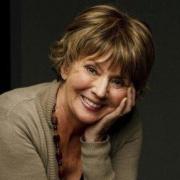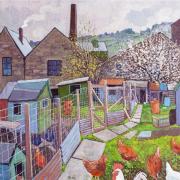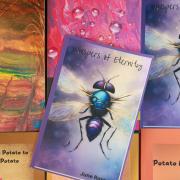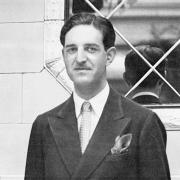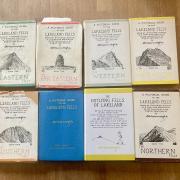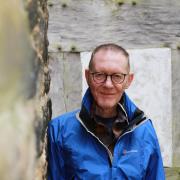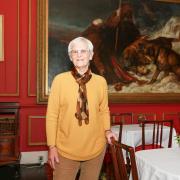When conductor Alex Robinson leads his orchestra into the opening theme of Elgar’s Enigma Variations next month, the usual nervy excitement of concert night will have an edge of poignancy.
Many in Lancaster University’s Great Hall will remember the last time the Haffner Orchestra performed this landmark of English music. It was April 2021, more than a year after concerts, choir rehearsals, folk sessions, jazz nights and band practices had fallen silent in the first pandemic lockdown. Instead of an auditorium, the ‘venue’ was the phone and computer screens on which the orchestra’s players and friends listened to a virtual performance on Zoom.
‘We’d all been restricted for so long; musicians and audiences had hugely missed interacting with one another,’ says Jo Wood, a retired professional bassoonist and woodwind teacher who has played in the Lancaster-based orchestra since 2015. She remembers recording herself playing the bassoon part of ‘Nimrod’ – the ninth Enigma variation – so the Haffner’s then musical director Jonathan Lo could mix it with her orchestral colleagues’ recordings to create an extraordinary ‘live’ full-orchestra performance. ‘It was very moving to express ourselves in our own front rooms, knowing we would be ‘performing’ and listening to it together.’

As a celebration of music’s power to connect, the choice of Enigma Variations is apt. The 1899 work was inspired by love and friendship – Edward Elgar wrote the 14 variations as musical tributes to close friends and family members – and the famously soul-stirring ‘Nimrod’ has been played at moments of national togetherness including the funeral of Diana, Princess of Wales, the London 2012 Olympic opening ceremony and the Coronation of King Charles.
‘For me, music is about people as much as sound,’ says new conductor Alex. Soon after becoming the Haffner’s musical director last summer, Alex was reaching out to the community beyond the concert hall, taking the orchestra to Lancaster’s Marketgate shopping centre and inviting passers-by to conduct Mozart’s 40th symphony. ‘Everyone who stopped to listen or waved the baton had a great time,’ he says. ‘An orchestra shouldn’t be some weird thing behind closed doors. I would love to do concerts in local pubs.’
A professional viola player and harpsichordist from Stockport who studied conducting at the Royal Northern College of Music in Manchester, Alex jumped at the chance to apply for the Haffner’s vacant musical directorship after Jonathan Lo went to Northern Ballet.

The orchestra, which was founded nearly 50 years ago, is regarded as one of the best amateur orchestras in the North West: among its 60-odd members, drawn mainly from the Lancaster area, are some who travel weekly from Manchester, North Yorkshire and the northern Lake District for the pleasure of playing in it.
As well as providing opportunities for ascendent professional soloists, such as the British-Nigerian soprano April Koyejo-Audiger, who will sing Berlioz’s song cycle Les nuits d’été at next month’s concert, the orchestra also attracts internationally acclaimed soloists: its recent performance of Rachmaninov’s second piano concerto with Martin Roscoe sold out the 600-seat Great Hall.
‘Everyone’s here because they absolutely love it,’ says Alex. ‘In a professional orchestra the musicians are there because they’re getting paid. Sometimes they enjoy it – but it’s not a hard and fast rule! In Haffner, the enthusiasm of people of different ages and backgrounds and professions, who just happen to be really good at their instruments, gives it a special energy.’

For cellist and doctor Rachel Cornwall, the sense of camaraderie – as well as the opportunity to play large-scale symphonic works – makes the orchestra something she can’t imagine giving up. An intensive care consultant at the Royal Lancaster Infirmary, she admits it can be a struggle to find the energy for Monday night rehearsals. ‘Sometimes, especially when its dark and wet, I can’t think of anything worse than leaving the house again,’ she says.
‘But within two minutes of starting to play all that goes out of my mind. The only thing I can concentrate on is the music. It’s a much better way of decompressing than just sitting on the sofa – and it’s so satisfying being part of this group of musicians, each making their own contribution and creating something amazing.’
The players’ exhilaration transmits to the audience, she believes. ‘The response we get is quite emotional. My parents come to most concerts, and some of my friends. They’re not really into classical music; they don’t listen to it at home. But it’s completely different when it’s live.’

Skilled musicians and iconic works don’t always equal big audiences, however. Professional orchestras struggle to fill seats, so how is the Haffner selling out concerts? It’s partly due to the volunteers who send out hundreds of leaflets and display concert posters all over Lancaster and surrounding villages, as well as the keen sense of pride with which local music lovers cherish their orchestra.
‘I go to concerts all over the country and in Europe, but for me there’s nothing to beat the Haffner,’ says Nick Gillibrand, the retired architect behind the Haffner window displays that pop up in empty city-centre shops around concert time. A music aficionado who’s been on the Haffner’s committee for 12 years, he recently signed up Preston North End football club as a sponsor (so watch this space, perhaps, for Dvořák at Deepdale stadium).
‘I feel it all around me in the auditorium,’ Nick says. ‘People walk away from the concerts glowing with satisfaction and talking about what a good evening they’ve had. It’s a joy to experience.’
The Haffner Orchestra will perform Elgar’s Enigma Variations alongside works by Debussy and Berlioz on Saturday March 2, 7.30pm at Lancaster University’s Great Hall. Tickets £16, students and benefits claimants £5, under-19s free, haffnerorchestra.org.




